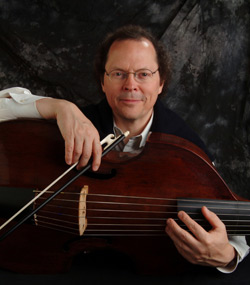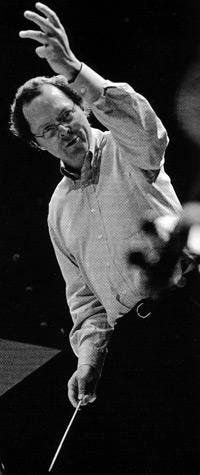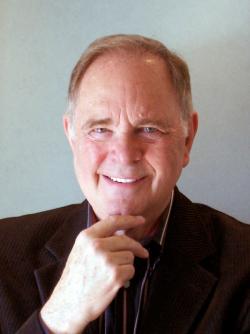- Home
- About
- About SCMS
- Directors
- Artists
- Vera Beths
- Steven Dann
- Marc Destrubé
- James Dunham
- Mark Fewer
- Eric Hoeprich
- Christopher Krueger
- Myron Lutzke
- Marilyn McDonald
- Douglas McNabney
- Mitzi Meyerson
- Pedja Muzijevic
- Anca Nicolau
- Jacques Ogg
- Loretta O'Sullivan
- Lambert Orkis
- Paolo Pandolfo
- William Purvis
- Marc Schachman
- Jaap Schröder
- Andrew Schwartz
- William Sharp
- Ian Swensen
- Lucy van Dael
- Ensembles
- Concerts
- The Collection
- Recordings
- Education
- Donate
Kenneth Slowik
 Artistic Director of the Smithsonian Chamber Music Society, Kenneth Slowik first established his international reputation primarily as a cellist and viola da gamba player through his work with the Smithsonian Chamber Players, Castle Trio, Smithson String Quartet, Axelrod Quartet, and with Anner Bylsma’s L’Archibudelli. Conductor of the Smithsonian Chamber Orchestra since 1988, he became conductor of the Santa Fe Bach Festival in 1998, and led the Santa Fe Pro Musica Chamber Orchestra from 1999 to 2004. He has been a soloist and/or conductor with numerous other orchestras, including the National Symphony, the Baltimore, Vancouver, and Québec Symphonies, the Filharmonia Sudecka, the Pleven Philharmonic, the Polska Orkiestra Sinfonia Iuventus, the KwaZulu-Natal Philharmonic, and the Cleveland Orchestra.
Artistic Director of the Smithsonian Chamber Music Society, Kenneth Slowik first established his international reputation primarily as a cellist and viola da gamba player through his work with the Smithsonian Chamber Players, Castle Trio, Smithson String Quartet, Axelrod Quartet, and with Anner Bylsma’s L’Archibudelli. Conductor of the Smithsonian Chamber Orchestra since 1988, he became conductor of the Santa Fe Bach Festival in 1998, and led the Santa Fe Pro Musica Chamber Orchestra from 1999 to 2004. He has been a soloist and/or conductor with numerous other orchestras, including the National Symphony, the Baltimore, Vancouver, and Québec Symphonies, the Filharmonia Sudecka, the Pleven Philharmonic, the Polska Orkiestra Sinfonia Iuventus, the KwaZulu-Natal Philharmonic, and the Cleveland Orchestra.
 Slowik’s impressive discography comprises over eighty recordings featuring him as conductor, cellist, gambist, and keyboard player for music ranging from the Baroque (Marais, Pandolfi, Couperin, Corelli, Bach) through the Classical (Haydn, Boccherini, Mozart, Beethoven, Schubert) and Romantic (Mendelssohn, Schumann, Onslow, Gade, Spohr) to the twentieth century (Schönberg, Mahler, Richard Strauss, Copland, Stravinsky). Of these, many have won prestigious international awards, including France’s Diapason d’Or and Choc, the “British Music Retailers’ Award for Excellence,” Italy’s Premio Internazionale del Disco Antonio Vivaldi, two GRAMMY® nominations, and numerous “Record of the Month” and “Record of the Year” prizes. More recent releases include several CDs of Haydn baryton trios with the ensemble Esterházy Machine, a disk of Shostakovich Chamber Symphonies, traversals of Schubert's Winterreise and Die schöne Müllerin with tenor John Elwes, a DVD film about Schönberg’s First Chamber Symphony and Verklärte Nacht, and a disc containing his own chamber orchestra arrangements of Mahler's Kindertotenlieder and Rückert Lieder. For nearly two decades a faculty member at Québec's L’Académie de musique du Domaine Forget, he currently teaches at the University of Maryland, the American Bach Soloists Academy, and the Baroque Performance Institute at the Oberlin College Conservatory, where he has served as Artistic Director since 1993. In 2011, he was named recipient of the Smithsonian Secretary's Distinguished Scholar Award.
Slowik’s impressive discography comprises over eighty recordings featuring him as conductor, cellist, gambist, and keyboard player for music ranging from the Baroque (Marais, Pandolfi, Couperin, Corelli, Bach) through the Classical (Haydn, Boccherini, Mozart, Beethoven, Schubert) and Romantic (Mendelssohn, Schumann, Onslow, Gade, Spohr) to the twentieth century (Schönberg, Mahler, Richard Strauss, Copland, Stravinsky). Of these, many have won prestigious international awards, including France’s Diapason d’Or and Choc, the “British Music Retailers’ Award for Excellence,” Italy’s Premio Internazionale del Disco Antonio Vivaldi, two GRAMMY® nominations, and numerous “Record of the Month” and “Record of the Year” prizes. More recent releases include several CDs of Haydn baryton trios with the ensemble Esterházy Machine, a disk of Shostakovich Chamber Symphonies, traversals of Schubert's Winterreise and Die schöne Müllerin with tenor John Elwes, a DVD film about Schönberg’s First Chamber Symphony and Verklärte Nacht, and a disc containing his own chamber orchestra arrangements of Mahler's Kindertotenlieder and Rückert Lieder. For nearly two decades a faculty member at Québec's L’Académie de musique du Domaine Forget, he currently teaches at the University of Maryland, the American Bach Soloists Academy, and the Baroque Performance Institute at the Oberlin College Conservatory, where he has served as Artistic Director since 1993. In 2011, he was named recipient of the Smithsonian Secretary's Distinguished Scholar Award.
James Weaver (1937-2020)
 James Weaver founded the Smithsonian Chamber Music Society in 1976, establishing the comprehensive presentation of historically informed performances which has gained international prestige. He devised and directed entertainments ranging from evenings of 19th-century American Ballroom Music (released as an award-winning disc on Nonesuch Records) to Handel’s Messiah (the first American recording with historic instruments and a men- and-boys choir; it enjoyed prodigious sales). As a performer, his award-winning recording (with Sonya Monosoff) of J. S. Bach’s Sonatas for Violin and Harpsichord was the first museum recording with historic instruments made for commercial distribution. He divided his time among the harpsichord, fortepiano, and organ, appearing throughout the United States, Europe, and South America, including the Edinburgh and Innsbruck festivals, and with the National and Baltimore symphonies. For many years Chair of the National Museum of American History’s Division of Cultural History, he left the Smithsonian to serve as Executive Director of the ten-year-long project to develop a National Music Center and Museum in association with the Smithsonian Institution and the Library of Congress. He served on the faculties of Boston University, Cornell University, the University of Maryland, Catholic University, Aston Magna, and as a founding faculty member of the Oberlin Baroque Performance Institute. He subsequently served as Executive Director of The Organ Historical Society, masterminding its move from Richmond, Va to the Stoneleigh estate in Villanova Pennsylvania.
James Weaver founded the Smithsonian Chamber Music Society in 1976, establishing the comprehensive presentation of historically informed performances which has gained international prestige. He devised and directed entertainments ranging from evenings of 19th-century American Ballroom Music (released as an award-winning disc on Nonesuch Records) to Handel’s Messiah (the first American recording with historic instruments and a men- and-boys choir; it enjoyed prodigious sales). As a performer, his award-winning recording (with Sonya Monosoff) of J. S. Bach’s Sonatas for Violin and Harpsichord was the first museum recording with historic instruments made for commercial distribution. He divided his time among the harpsichord, fortepiano, and organ, appearing throughout the United States, Europe, and South America, including the Edinburgh and Innsbruck festivals, and with the National and Baltimore symphonies. For many years Chair of the National Museum of American History’s Division of Cultural History, he left the Smithsonian to serve as Executive Director of the ten-year-long project to develop a National Music Center and Museum in association with the Smithsonian Institution and the Library of Congress. He served on the faculties of Boston University, Cornell University, the University of Maryland, Catholic University, Aston Magna, and as a founding faculty member of the Oberlin Baroque Performance Institute. He subsequently served as Executive Director of The Organ Historical Society, masterminding its move from Richmond, Va to the Stoneleigh estate in Villanova Pennsylvania.


